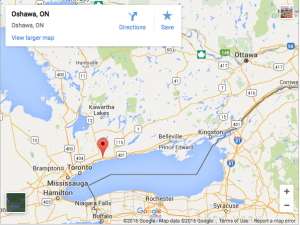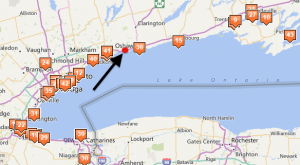By Zack Bradley
The City of Oshawa is taking the first steps to develop its waterfront—even if a proposed ethanol plant is still in the works.
The suburban city on the outskirts of Toronto is currently undergoing an environmental assessment on its waterfront, which is required to meet provincial standards.
According to Paul Ralph, a City of Oshawa manager, the city hopes to start construction of the new waterfront park and trails sometime this year.

The environmental assessment is the first piece of work done by the city since finding out in the late 2000s that an ethanol plant was being planned on the waterfront.
While the Oshawa City Council has opposed the ethanol project on many occasions, its dissent has not received much recognition by the federal government or the Oshawa Port Authority, the federal authority that owns the property where the proposed plant would be.
Yet, after more than a year of silence from both the ethanol plant developer and the federal government authority, many city councillors say they are beginning to think the project is no longer going to happen.
However, not everyone agrees.
Oshawa Mayor John Henry says until it is confirmed that the plant is not being built, problems still exist, especially when it comes to development.
”Refer to Oshawa harbour as a blank canvas,” says Mayor Henry. “You only get an opportunity once for this type of development and we can really turn this into a perfect picture. Yet in order to move forward we just need to rid the issue of ethanol because nobody is going to build a condo next to a refinery.”
In order to get a response, Mayor Henry sent a request to the Trudeau government in fall of 2015 for the federal government to look into the ethanol plant issue. He is currently waiting for a response.
“We’ve done everything we’ve can to stop this,” says John Henry.
The Oshawa waterfront has had its share of problems over the years. In 2002 its marina was shut down because of contamination and has been shielded from the public ever since. In 2014, the Treasury Board of Canada declared the area a high priority contaminated site and started to remediate the land, a process that cost more than $2 million, according to online records.
Only major city on Lake Ontario without a Public Marina
As seen from this map, Oshawa is the only major city without a marina for its citizens to use. Many people travel to neighbouring Whitby or Newcastle to dock their boats.
As for the future of the waterfront, Krystn Tully, vice-president of Lake Ontario WaterKeeper—a charity that promotes swimmable, drinkable and touchable water on Lake Ontario—says any talks of an ethanol plant near the former marina is a scary thought for a residents who have already lost so much of their waterfront over the years.
“A plant like this will deter people from the waterfront and if you can get rid of people, then the level of pollution a community is willing to tolerate goes way up,” says Tully, who grew up in Oshawa. “This was a big concern when the marina first shut down and this is still a legitimate concern today.”

“Oshawa is the only great city on Lake Ontario that doesn’t have a public marina,” continues Tully. “I have never seen anything else like this on the lake. It has really hindered the growth of the city.”
In order to move forward, Tully says the waterfront needs projects that encourage people to come visit, rather than scare them away.
“We need people down at the waterfront actively boating and being involved to prevent further damage. It’s when you can get rid of people that the level of pollution a community is willing to tolerate goes way up.”

